
Exposé Online
What's old
Exposé print issues (1993-2011)
- 1 (October 1993)
- 2 (February 1994)
- 3 (May 1994)
- 4 (August 1994)
- 5 (October 1994)
- 6 (March 1995)
- 7 (July 1995)
- 8 (November 1995)
- 9 (March 1996)
- 10 (August 1996)
- 11 (February 1997)
- 12 (May 1997)
- 13 (October 1997)
- 14 (February 1998)
- 15 (July 1998)
- 16 (January 1999)
- 17 (April 1999)
- 18 (November 1999)
- 19 (May 2000)
- 20 (October 2000)
- 21 (March 2001)
- 22 (July 2001)
- 23 (December 2001)
- 24 (April 2002)
- 25 (September 2002)
- 26 (February 2003)
- 27 (August 2003)
- 28 (December 2003)
- 29 (April 2004)
- 30 (September 2004)
- 31 (March 2005)
- 32 (September 2005)
- 33 (May 2006)
- 34 (March 2007)
- 35 (January 2008)
- 36 (October 2008)
- 37 (July 2009)
- 38 (July 2010)
- 39 (Summer 2011)
Features
Enraging the Painter Next Door —
The Zero Times Everything Interview
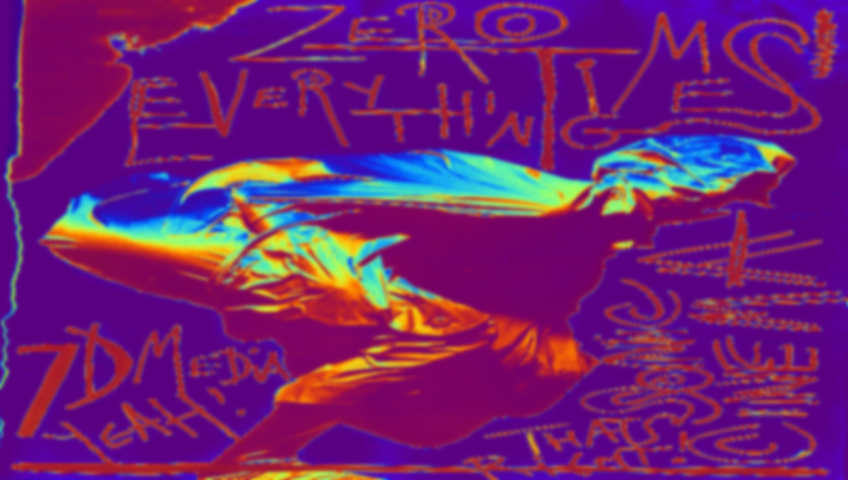
Among the many groups that have originated with Robert Fripp’s Guitar Craft seminars, Zero Times Everything stands as an outlier. While there are guitars involved, the music is largely electronic, with programmed percussion parts, heavily processed sounds, and sampled voices. About as far from the California Guitar Trio (for example) as you can get, at least on the surface.
by Jon Davis, Published 2017-05-19
I was fortunate to connect to the three band members by email, and they were kind enough to answer my questions. The responses were minimally edited for clarity and punctuation.
- RS: Richard Sylvarnes — Kaoss Pads, loops, synths, rhythms, guitars, vocals
- PR: Pietro Russino — guitars, loops, violin
- TG: Tony Geballe — guitars, synths, loops
What are your earliest musical memories? How did your conception of music develop?
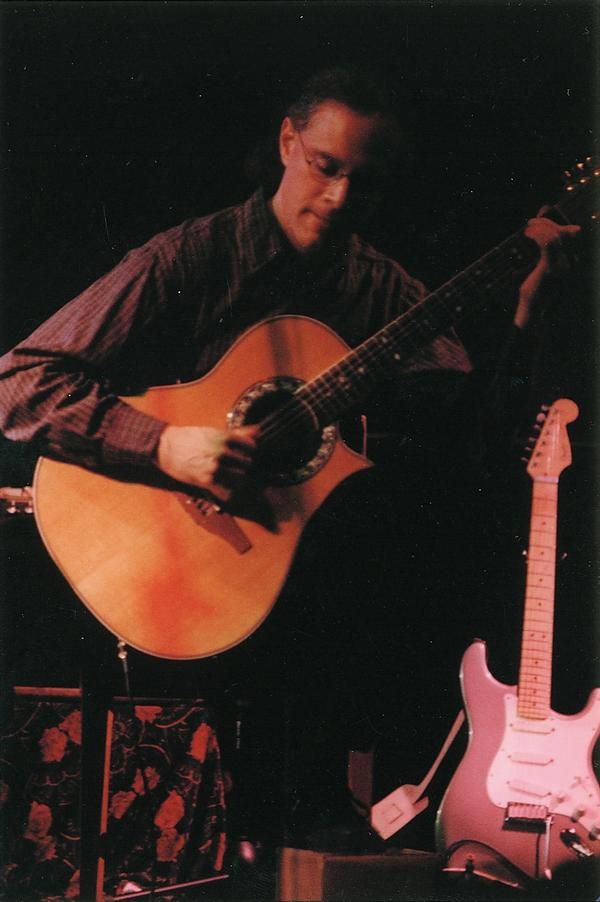 TG: Because I have seven older siblings and parents who loved classical music and the popular music of their era, I grew up hearing everything, and loved all of it. My eldest sister was an early student of ethnomusicology, so I even heard music from many different cultures, then unknown to most Westerners. So nothing has ever sounded strange to me, other than certain Japanese classical forms and one processional from Indonesia I once heard!
TG: Because I have seven older siblings and parents who loved classical music and the popular music of their era, I grew up hearing everything, and loved all of it. My eldest sister was an early student of ethnomusicology, so I even heard music from many different cultures, then unknown to most Westerners. So nothing has ever sounded strange to me, other than certain Japanese classical forms and one processional from Indonesia I once heard!
RS: I had piano lessons starting around six. "Volga Boatmen" springs to mind. But it wasn't until my early teens when music took hold of me. I "magically" bought a guitar when I was twelve. I say "magically" because I never had any notion of buying or playing a guitar until I accompanied my mother to Sam Ash, she played the piano, and I became entranced by an aisle full of hanging guitars. I bought one with my first earned money. From there I devoted myself to playing the guitar and studying music.
PR: My uncle is a drummer and my father had a bar concession in the town theater, so I was exposed to music early on, my earliest memories are around four years old. Italian pop, R&B, and Sardinian folk music was what I heard. I think when I was about seven, my family had a restaurant / dance club in a little beach town, and the band with the season engagement used to leave their instruments there, so I learned how to turn on the gear, of course the guitar was my choice.
What kind of formal schooling do you have in music?
TG: Some piano and guitar lessons as a kid. In college I was fortunate to meet an amazing sound engineer named Glenn White at the University of Washington, who advised me through getting a degree in “Musical Engineering,” which I used to take all the music classes I wanted without having to fulfill someone else’s idea of a music education. I was able to study with Indian musicians, learn from African and Indonesian musicians, and of course the Turkish musicians who utterly changed my life — I ended up spending a year in Turkey for that. I attended two summer workshops with Ralph Towner and the members of Oregon, and became Ralph’s house-sitter for his first year in Seattle. Just being around him was the best education. And of course the whole Guitar Craft experience, while not a “formal music education,” was more than formative for me.
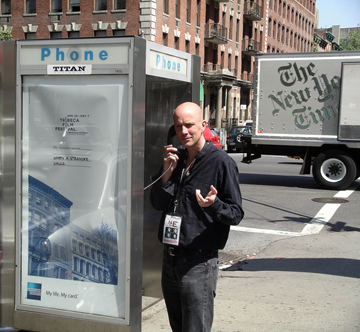 RS: I studied the piano as a young kid and guitar privately for many years. Along with those lessons I was taught music theory. In my late teens I studied at Berklee College of Music and in my early twenties studied third world music and the music and ideas of Harry Partch.
RS: I studied the piano as a young kid and guitar privately for many years. Along with those lessons I was taught music theory. In my late teens I studied at Berklee College of Music and in my early twenties studied third world music and the music and ideas of Harry Partch.
PR: I am initially self taught, later in my twenties I study some classical guitar, music theory with Woody Mann at the New School, then Guitar Craft and Irish Fiddle
Tell me about your musical activities before Zero Times Everything.
TG: After playing on a less than semi-pro level in Seattle for a few years, I was blessed to play a lot of concerts around the world with the League of Crafty Guitarists. After that I moved to NYC, where I developed my solo 12-string guitar music, and became connected to the brilliant theater director Karin Coonrod, for whom I’ve composed music, designed sound, and performed in NYC and other places in the US and in Italy. I played in a few bands around the city. Then, I was the least interesting member of the Trey Gunn Band, which included two Warr Guitars and a phenomenal drummer / percussionist whose setup required most of our 22 road cases to transport. And I became a member of Braindance, the progressive darkwave band featuring the extraordinary music and playing of Vora Vor, and the vocal stylings of Sebastian Elliott. Braindance also features the drumming of Kenny Grohowski — if you haven’t yet heard of him, you will.
RS: Most of my musical activities involved making music for my films, therefore a sense of mood and atmosphere was very important. In the early 2000s I formed the group Sylvarluxe with the Welsh singer Katy Lewis. We released three records and, hopefully, our fourth in the near future. I’m also in a band called the Underworld Oscillator Corporation with Rachel and Gabriel Guma and our most recent performance was incorporating a live soundtrack to the silent Lon Chaney version of The Phantom of the Opera at the Morbid Anatomy Museum.
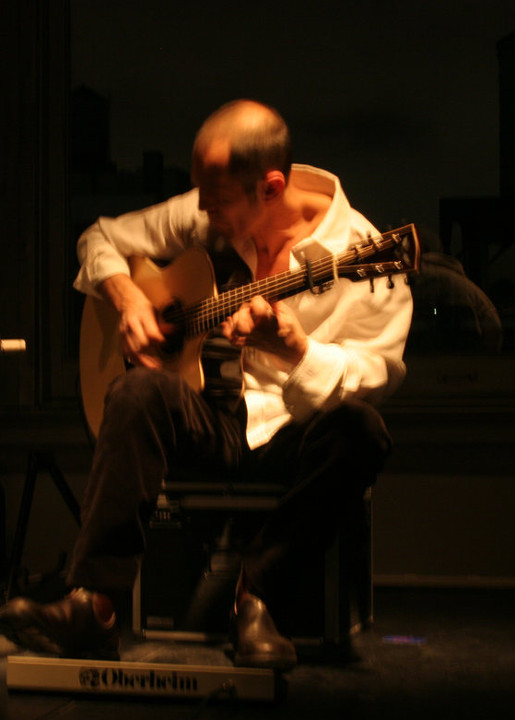 PR: I played with cover bands in Italy in my teens, when I lived in London I got interested in acoustic fingerstyle, playing in some pubs but mostly busking in the tube. Since I’ve moved to New York I had the opportunity to play in different styles of music and group settings, the first was Wild and Wonderful, an art trio with the greatly missed singer / art gallerist Pat Hearn. Then I’ve played with I Giullari di Piazza, an Italian renaissance folk group led by singer percussionist Alessandra Belloni. After that I started attending Guitar Craft seminars in West Virginia, where I met Tony and Richard, I share my blessing with Tony for the privilege of touring and recording with The League of Crafty Guitarists. Following that was the Prog / World Fusion quartet The Point, with Tony Geballe in the role of producer. The solo looping period started right after that, developing in what I call Hypnofolk, also the title of my solo CD. I am also part of the Diaz Ensemble, a World Fusion group led by fellow Crafty Jon Diaz.
PR: I played with cover bands in Italy in my teens, when I lived in London I got interested in acoustic fingerstyle, playing in some pubs but mostly busking in the tube. Since I’ve moved to New York I had the opportunity to play in different styles of music and group settings, the first was Wild and Wonderful, an art trio with the greatly missed singer / art gallerist Pat Hearn. Then I’ve played with I Giullari di Piazza, an Italian renaissance folk group led by singer percussionist Alessandra Belloni. After that I started attending Guitar Craft seminars in West Virginia, where I met Tony and Richard, I share my blessing with Tony for the privilege of touring and recording with The League of Crafty Guitarists. Following that was the Prog / World Fusion quartet The Point, with Tony Geballe in the role of producer. The solo looping period started right after that, developing in what I call Hypnofolk, also the title of my solo CD. I am also part of the Diaz Ensemble, a World Fusion group led by fellow Crafty Jon Diaz.
How did Zero Times Everything come together?
TG: I’ve known Richard and Pietro since the mid-80s. Richard asked Pietro and me to help him develop live music to accompany his film The Last Words of Dutch Schultz. After that, we began playing to some of his other films, and the music acquired a life of its own, as they say.
Was the visual element part of the idea for the band from the beginning?
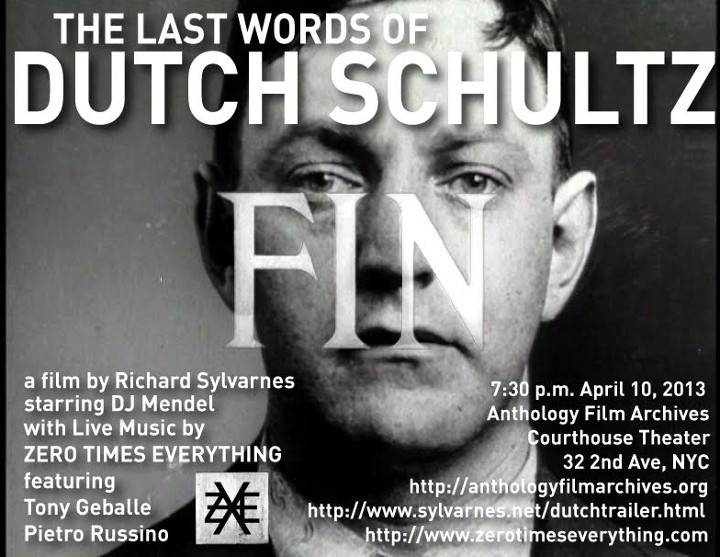 TG: Yes, it was the basis of forming the band.
TG: Yes, it was the basis of forming the band.
RS: It certainly was our raison d'être but we have organically grown from our beginnings. As far as the visual component is concerned, some of the films came after the recording process. "Kapital" comes to mind, which is a piece I brought pretty much fully formed to rehearsal for further improvisation and then made the film afterwards. But then there's "Vox Populi" where the film was completed and the music written for the pre-existing visuals. We have also performed with Bradley Eros and his group of multi-projectionists called Optipus.
Tell me about some of the technological elements of ZXE’s music.
TG: I have moved from using the Roland VG-99 with ZXE, to the VG-88, and now I run through various effects and simulators on an iPad straight into the mixing board, with a tiny Bluetooth pedalboard.
RS:I feel there is a renaissance in analog synth technology. I have the Korg Minilogue which is a combination of modern technology and analog synth technology. A wonderful instrument. I also have a new Korg MS-20 which simulates the classic analog version. And when I feel the music needs a little chaos I pull out my Kaoss Pad.
PR: I am very happy of the changes from a Line6 Pod Pro system through a Mesa Boogie, to a Mac with Logic sounds and USB Apogee GIO pedalboard straight into the PA.
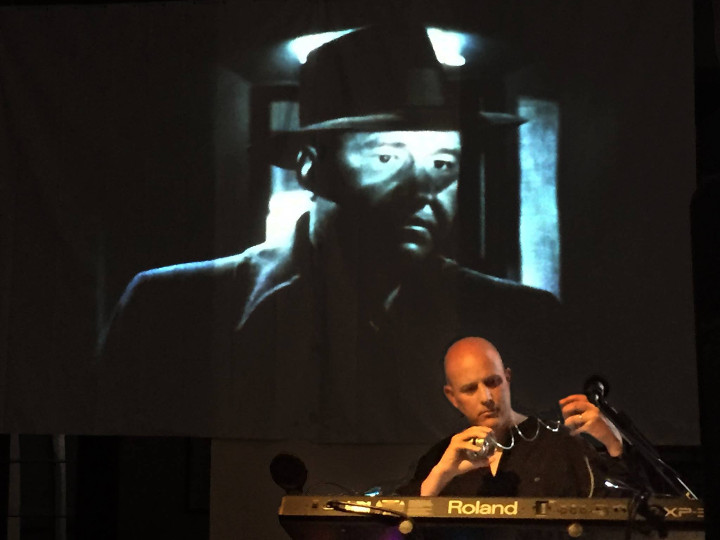 It seems like in the past, relying on technology (especially computers) tended to limit spontaneity, or at least have that reputation. Do you find that to be true anymore?
It seems like in the past, relying on technology (especially computers) tended to limit spontaneity, or at least have that reputation. Do you find that to be true anymore?
TG: I think that is related to the individual artist. There may be a learning curve, but the creative spirit will find a way to use any tool, if the body which coats that spirit allows it to!
How does ZXE music come about? Are pieces composed by one member or another, or the result of improvisation?
RS: We incorporate many methods to making music, from strict composition to total improvisation and a combination thereof. In a recent interview we were asked how is it possible that you can write a song like "Accident." A fair question since the song has qualities that are amorphous and atmospheric and then there are moments that appear thoroughly composed. For this particular piece I made a slow moving cold, dark electronic drum track and the femme fatale's voice. This is one of our methods of composition — to bring the barest of elements and then improvise over those elements. This particular improvisation lasted around 45 minutes. We were so entranced by what we were doing that the painter whose studio is adjacent to ours was banging on the metal door that separates our spaces for the entirety of the improv. We never heard him. He was livid and remains so. I took the separate tracks and edited them to the final 11 minute piece. Then Tony did further manipulations to the material with "Accident" being the result. This is an example of a mix of compositional elements and improvisation.
How often does ZXE play live? What are some notable shows you’ve done?
TG: We play live as often as possible! Two shows come to mind: the main presentation of Dutch Schultz at the Anthology Film Archives in 2013, and our performance at the Film-Makers Co-op benefit that year, which also included Laurie Anderson and John Zorn (who complimented our set!).
RS: We held back last year on live performance. We were keyed in on finishing Sonic Cinema. Making a record and performing live are two different animals, with different requirements — for me anyway. And my main concern was recording and finishing this record.
PR: The 2014 New York Festival of Lights comes to mind, it was an epic setting and we played only five minutes.
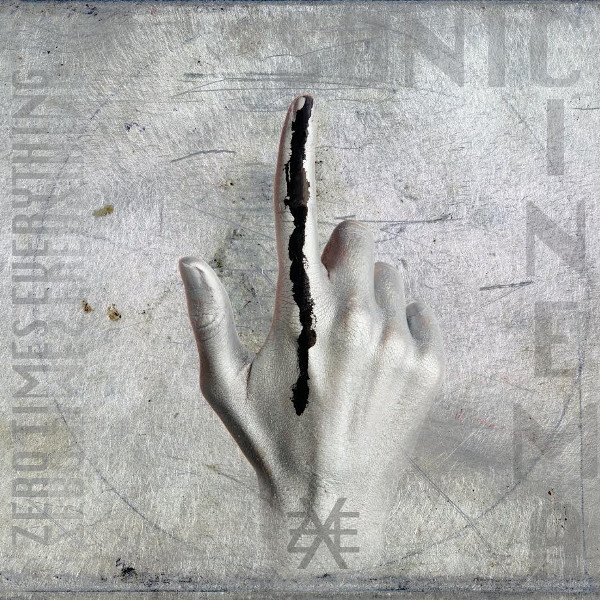 Tell me a bit about the recording of the album.
Tell me a bit about the recording of the album.
TG: The album is largely pieces which grew out of studio improvs and / or playing to Richard’s films, which he then did some preliminary editing on and then I took to my studio for further editing, processing and mixing. There are a few pieces which are ideas that Pietro or I brought to the band, either live or by recording, which we then added bits to and created forms for.
RS: Almost the entire record was recorded at our studio in Greenpoint, Brooklyn, an industrial section of the city.
PR: Except for some overdubs that we did with file sharing.
On Sonic Cinema, ZXE combines electronic music with progressive rock in a way I haven’t heard before. Is that a deliberate path you’re choosing?
TG: My take: We are deliberately choosing the path of ZXE, but not in relation to other music we’ve heard or genres, except insofar as everything we’ve heard influences us. This path is partly articulated, partly intuitive. We allow ourselves a tremendous amount of freedom to bring in what excites us musically, no matter the “genre,” style or origin. And then we see what ZXE makes of it.
RS: I'm deeply into electronic music and even club culture, for that matter. It’s really a sign of our times and I think we will delve deeper into these elements in the future.
PR: I would like to try a combination of acoustic instruments as well, that will be challenging.
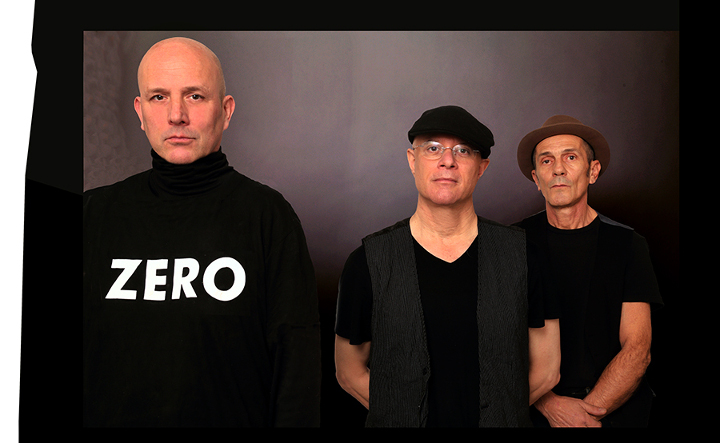 One of the tracks that provides a link to progressive rock is “Schizoid.” How did that one in particular come about?
One of the tracks that provides a link to progressive rock is “Schizoid.” How did that one in particular come about?
RS: I was in the process of gathering material for a film I made called Here Comes Everybody, affectionately called H.C.E., and I was recording my daughter reciting many different texts and quotations; poetry, prose, comic books, newspapers, other films. The idea being that through these disparate texts I would make a film about western history. I never used the text to "Schizoid Man" in the film so I had this material sitting on my shelf, so to speak. It was material waiting for a home. She was six years old when she recited the text and I don't think she had a clue as to what she was saying, which is one of the reasons I think her reading has such weight. It's not just the innocence but the cold, deadpan reading. This is one of the elements I took to one of our rehearsals. I also had the opening string arrangement which has nothing in common with the original song so it pegged the song in a different way than the original. In the course of the song we do actually play the famous riff but very slowly, almost in an attempt to deconstruct the riff itself. We actually talked about not putting it on the record thinking it would give the wrong impression; that people would be expecting an exact copy and would be pissed off that it wasn't but that's not been the case. Just the opposite, actually. In fact a review praised its electronic cacophonous rage. Plus, since we all met at Guitar Craft we felt the use of the song was appropriate.
What are the future plans for ZXE?
TG: We are beginning preproduction for the next CD, and we hope to be playing out quite a bit to help promote this CD and to bring new music to life.
What activities do you have outside of ZXE?
TG: I do production and mixing work — currently completing Patrick Smith’s second solo guitar CD, producing the second CD by a Mexican duo called Doble Vida, and getting into making the third Hellboys CD, Hellboys IV. I recently provided music for an informational video by a public service group called “Stop Sexual Assault In Schools.” I also work in theater, as composer, sound designer, and sound technician with the brilliant director Karin Coonrod and her company La Compagnia de’ Colombari. I give a few guitar lessons here and there…
RS: Photography and filmmaking are my prime concerns. I’m very involved in the experimental film community in New York City and am vice president of the New American Cinema Group which is the oldest distributor of avant-garde films in the world.
PR: I do some work in high end furniture design and solo acoustic guitar / looping gigs as Hypnofolk. I play with Jon Diaz in his group and as a duo. I’ve also spent the last few years trying desperately to learn the fiddle / violin.
Filed under: Interviews
Related artist(s): Robert Fripp, Trey Gunn, Braindance, Tony Geballe, Zero Times Everything
More info
http://www.sylvarnes.net
http:// www.zerotimeseverything.com
What's new
These are the most recent changes made to artists, releases, and articles.
- Release: 8x8 - Life During Wartime
Updated 2024-04-23 17:55:39 - Review: Cheer-Accident - Vacate
Published 2024-04-23 - Release: s475e - Next Stop Earth
Updated 2024-04-22 16:06:30 - Artist: s475e (Darius Speier)
Updated 2024-04-22 16:05:44 - Release: Jim Black & the Shrimps - Ain't No Saint
Updated 2024-04-22 15:59:58 - Release: Jim Black Trio - Reckon
Updated 2024-04-22 15:58:55 - Release: Jim Black - Malamute
Updated 2024-04-22 15:57:31 - Release: Jim Black Trio - The Constant
Updated 2024-04-22 15:56:17 - Release: Natsuki Tamura / Jim Black - NatJim
Updated 2024-04-22 15:54:36 - Release: Mono - Oath
Updated 2024-04-22 15:49:48 - Release: The Cyberiam - Unobtainium
Updated 2024-04-22 15:46:54 - Release: Pete Ham - Keyhole Street
Updated 2024-04-22 15:44:27 - Release: Pete Ham - Golders Green
Updated 2024-04-22 15:43:29 - Release: Pete Ham - 7 Park Avenue
Updated 2024-04-22 15:41:03 - Release: Human Feel - Gold
Updated 2024-04-22 15:35:23 - Release: Ikue Mori - Obelisk
Updated 2024-04-22 15:33:39 - Release: Human Feel - Galore
Updated 2024-04-22 15:25:33 - Release: David Binney - Balance
Updated 2024-04-22 15:20:23 - Release: David Binney - South
Updated 2024-04-22 15:15:33 - Release: Gordon Grdina / Jim Black - Martian Kitties
Updated 2024-04-22 15:00:09
